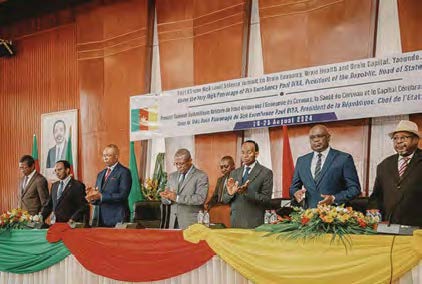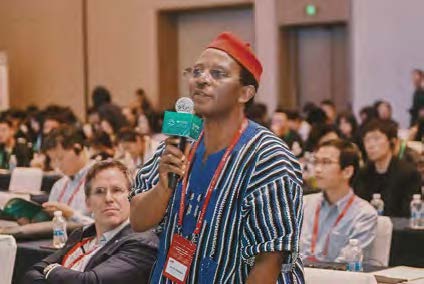Alfred K. Njamnshi
Founder and CEO,
Brain Research Africa Initiative (BRAIN)
Harris A. Eyre
Lead and Harry Z. Yan and Weiman Gao Senior Fellow for Neuro-Policy,
Rice University’s Baker Institute for Public Policy, and
Executive Director of the Brain Capital Alliance and Brain Economy Hub
Zul Merali
Founding Director,
Brain and Mind Institute, Aga Khan University
Olivera Nesic-Taylor
Senior Science Advisor,
Brain and Mind Institute, Aga Khan University
Graham Fieggen
Director of the Neuroscience Institute
Helen and Morris Mauerberger Professor and Head, Division of Neurosurgery,
University of Cape Town
Download PDF
“Brain health is central to who we are as individuals and is increasingly appreciated
as necessary for a healthy economy.”
-The Lancet Neurology Editorial, December 20241
 Under the very high patronage of the President of the Republic of Cameroon, His Excellency Paul Biya, Brain Research Africa Initiative (BRAIN) and the Cameroon Government organized the First High-Level African Science Summit on Brain Economy, Brain Health & Brain Capital in Yaoundé
Under the very high patronage of the President of the Republic of Cameroon, His Excellency Paul Biya, Brain Research Africa Initiative (BRAIN) and the Cameroon Government organized the First High-Level African Science Summit on Brain Economy, Brain Health & Brain Capital in Yaoundé
The Yaoundé Declaration for the Brain Economy, Brain Health, and Brain Capital has received support from the President of Cameroon2,3. It provides a platform for radical, cross-sectoral innovation in global brain health, led by Africa. The goal is to boost economic productivity and well-being. This declaration is timely given that Cameroon was the President of the 79th Session of the United Nations General Assembly (September 2024).
Brain Health Beyond the Health Sector
We commend the work of the World Health Organization (WHO) in advancing the brain health position statement4 and brain health in the context of the “Intersectoral Global Action Plan 2022-2031 implementation toolkit”5. Solving brain health challenges will require major reprioritization and transitions across most major sectors — a systems approach. Incremental change will not be sufficient. There are few silver bullets. No technology, policy, or actor alone can achieve these critical shifts. It will take a community of people working together across the globe and across systems to employ innovative solutions and accelerate change.
There is an urgent need for holistic change in how we manage mental and neurological disorders and how we protect or optimize brain functions. The global prevalence and cost of these disorders are among the highest of any medical condition and are projected to rise even more in the coming years6. We have now transitioned from an era of brawn to the era of the brain, where good brain health is essential for smooth skill-based economic transitions. It is evident that transitions such as the green transition, digital transition, and the bioeconomy transition are necessary for global wellbeing and sustainability7. It is clear that optimal human brain functioning is essential to navigate the modern world successfully.
Advances in brain science highlight new ways of nurturing better brain health and diagnosing and treating brain malfunction quickly and effectively8. Alongside rapidly evolving medical approaches, there are also a range of established and novel non-medical approaches to address the variety of stressors assaulting the brain, including managing the impact of environmental challenges on brain health9,10.
The benefits of advancing brain health go far beyond managing brain disorders. Protecting the brain structure, function, and wellbeing with protective factors such as adequate sleep, psychologically and physically safe environments, good nutrition, etc., allows for optimal brain skills essential for economic and societal progress.
The Road to the Yaoundé Declaration
The Yaoundé Declaration’s story outlines a systems-based framework for dealing with such challenges and promoting a brain-positive economic transformation, also known as a brain economy. The brain economy transformation is a global goal to stop and reverse the loss of brain capital, an economic asset encompassing social, emotional, and cognitive brain resources11-14.
The Yaoundé Declaration for the Brain Economy, Brain Health, and Brain Capital marks a milestone in advancing global brain health and economic resilience for societal transformation. This declaration provides a roadmap for the transformation of the brain economy.
In Box 1 we outline the key steps in the development of the Yaoundé Declaration.
“On behalf of the Head of State, the Government of Cameroon extends its congratulations to Brain Research Africa Initiative (BRAIN) and to all its global, regional and national partner organisations, as well as the leaders and experts who have tirelessly contributed over the past few months to the creation of this historical document.”
-His Excellency Chief Dr. Joseph Dion Ngute, Prime Minister of Cameroon, at the official launch of the Yaoundé Declaration, August 22, 2024, Yaoundé, Cameroon.
About the Yaoundé Declaration
The Yaoundé Declaration provides various stakeholders in the private and public sectors, policymakers, philanthropies, investors, advocates and global leaders with insights to drive policy, investment and action. Decisionmakers can use this paper to understand the state of play across each system, determine which challenges require the greatest attention, and determine which actions can accelerate change.
Key “Calls” Noted in the Yaoundé Declaration
The Yaoundé Declaration contains the following:
- Call for international frameworks for the transformation into a brain-positive economy and for country governments and stakeholders to develop and implement national Brain Economy plans. Lessons must be learned from clean energy transition and digital-artificial intelligence transition plans;
- Call for international data creation, curation, tools and frameworks to support and sustain the promotion of brain health and for country governments and stakeholders to develop and implement national/subnational brain Health plans;
- Call for the establishment of a Global Brain Council (“The Council”): Establish a council of leaders across the brain health space (e.g., researchers, philanthropists, funders, designers, and implementers), creating a potential charter and membership. The Council will identify and curate brain health innovations ripe for investment;
- Call for the creation and sustainable funding of a Global Brain Capital Centre/Institute of Excellence in Africa to build brain capital through research, innovation, capacity building and evidence-informed policy content development on education, science, culture, communication, built environment, economics, and information to foster mutual understanding and respect for our planet; and country governments and stakeholders to develop and implement Brain Capital plans. Work on a Brain Economy Hub has begun;
- Call on high-income countries (HICs) to work together with LMICs in the spirit of UNGA79 President’s mandate theme “Unity in Diversity” within the above and other frameworks to reduce global, regional, and local disparities while preserving our rich human and planetary diversity;
- Call on the United Nations General Assembly to consider formalizing this Declaration to raise awareness for these issues across member states and the private and non-government sectors;
- Call to advance this agenda in the coming in major policy fora years such as the United Nations Summit of the Future, United Nations Framework Convention on Climate Change (UNFCCC) Conference of the Parties (COP), World Economic Forum (WEF), the High-Level Meeting of the UNGA on the Prevention and Control of Non-Communicable Diseases, G7, and G20.
The Declaration’s Catalytic Effects
 Presentation of the Yaoundé Declaration at the 2024 World Young Scientist Summit (WYSS) and 5th Oujiang International Forum on Brain Health & Alzheimer’s Disease, as part of the International Brain Initiative Delegation, in Wenzhou, China
Presentation of the Yaoundé Declaration at the 2024 World Young Scientist Summit (WYSS) and 5th Oujiang International Forum on Brain Health & Alzheimer’s Disease, as part of the International Brain Initiative Delegation, in Wenzhou, China
This Declaration reflects its African leadership and has received generous support from global actors15. The Yaoundé Declaration has recently been echoed by the Vice President of the European Brain Commission, Prof. Claudio Bassetti, to the European Parliament Health Committee, emphasizing the call of the Declaration for the uptake of “brain health” into all national, regional, and global policies16. It was also noted in a recent European Policy Centre publication that explored the role of the brain economy in boosting European economic competitiveness17.
The World Economic Forum Annual Meeting 2025, G20 South Africa, and G7 Calgary are ideal platforms to utilize the Yaoundé Declaration for driving transformative progress in brain health and advancing brain economies worldwide.
We must rapidly transition from a brain-unhealthy economy to a brain-healthy economy, to unlock greater wellbeing, productivity, and creativity. This transition means investing in the brain capital of nations.
——————
1 The Lancet, N., United action is needed to prioritise brain health. Lancet Neurol, 2024. 23(12): p. 1169.
2 Njamnshi, A.K., et al. The Yaoundé Declaration. Lancet Neurol. 2024 Oct;23(10):966-967. doi: 10.1016/S1474-4422(24)00364-8. Epub 2024 Aug 22. PMID: 39182501.
3 Njamnshi, A.K., et al, African Leadership in Brain Diplomacy: The Yaoundé Declaration Advances the Global Brain Economy Playbook for Better Brain Health. Neuroscience, 2024. Pre-print; Under Review.
4 WHO, Optimizing brain health across the life course: WHO position paper, W.H.O. Brain Health Unit, Editor. 2022: Geneva.
5 WHO, Intersectoral global action plan on epilepsy and other neurological disorders 2022–2031: implementation toolkit. WHO, 2024.
6 Brain Health Atlas, www.brainhealthatlas.org
7 Nail-Beatty, O. and e. al, Brain health is essential for smooth economic transitions: towards socio-economic sustainability, productivity and well-being Brain Communications, 2024. 6(6).
8 Ibanez, A., M.L. Kringelbach, and G. Deco, A synergetic turn in cognitive neuroscience of brain diseases. Trends Cogn Sci, 2024. 28(4): p. 319-338.
9 Eyre, H.A., et al., Brain capital is crucial for global sustainable development. Lancet Neurol, 2024. 23(3): p. 233-235.
10 Ibanez, A., et al., Neuroecological links of the exposome and One Health. Neuron, 2024. 112(12): p. 1905-1910.
11 Eyre, H.A., Graham, C., Njamnshi, A.K., et al., 4 ways to make our economy brain healthy. The Brookings Institution Policy Paper Series 2024.
12 Moose, A., K. Enomoto, and H.A. Eyre, Brain gain: How improving brain health benefits the economy. Agenda, World Economic Forum, 2024.
13 Eyre, H.A. and E. al, The Brain Economy: Advancing Brain Science to Better Understand the Modern Economy. Malaysian Journal of Medical Science, 2024.
14 Smith, E., et al., A Brain Capital Grand Strategy: toward economic reimagination. Mol Psychiatry, 2021. 26(1): p. 3-22..
15 DAC. Davos Alzheimer’s Collaborative Applauds Africa’s Leadership on Brain Health. 2024 12/12/24]; Available from: https://www.davosalzheimerscollaborative.org/news-press/davos-alzheimers-collaborative-applauds-africas-leadership-on-brain-health.
16 EBC. EBC Invited to Address the European Parliament Public Health Committee. 2024 12/12/24]; Available from: https://www.braincouncil.eu/ebc-invited-to-address-the-european-parliament-public-health-committee/.
17 Swieboda, P., E. Kuiper, and H.A. Eyre, Brain economy: Novel Approach to Europe’s Growth. European Policy Centre, 2024.
Suggested Citation:
Njamnshi, Alfred K., Harris A. Eyre, Zul Merali, et al. 2025. “Empowering the Global Brain Economy: African Leadership through the Yaoundé Declaration.” AARP International: The Journal, vol. 16: 78-81. https://doi.org/10.26419/int.00368.017.